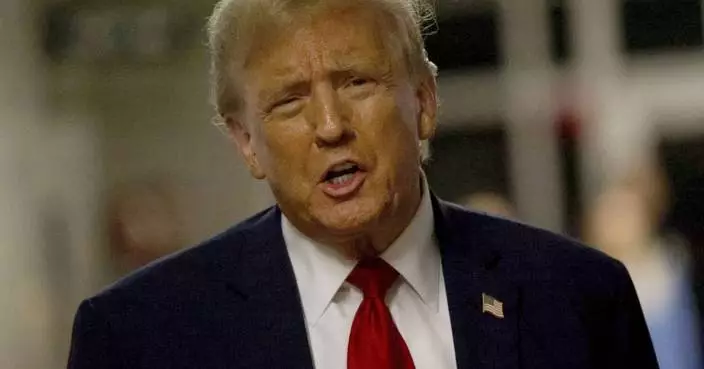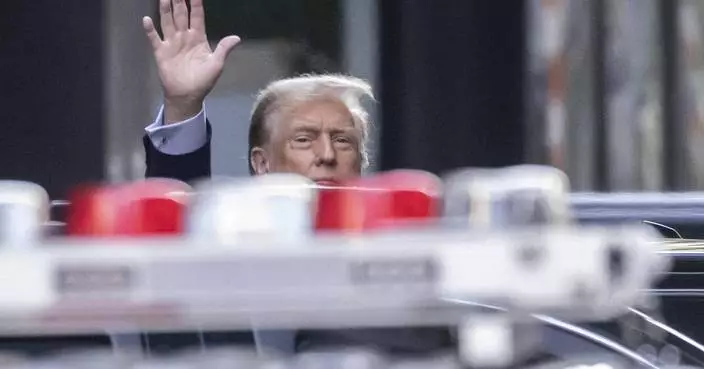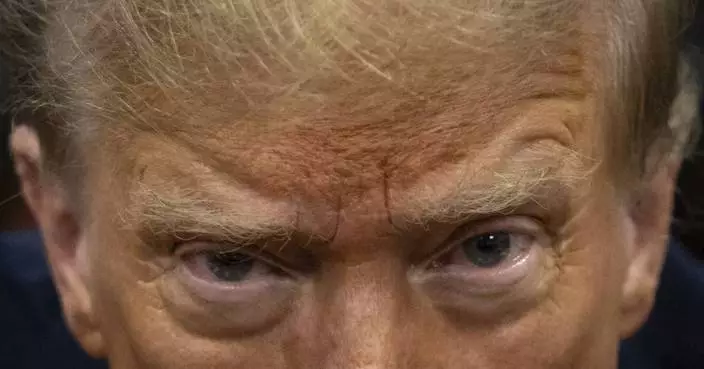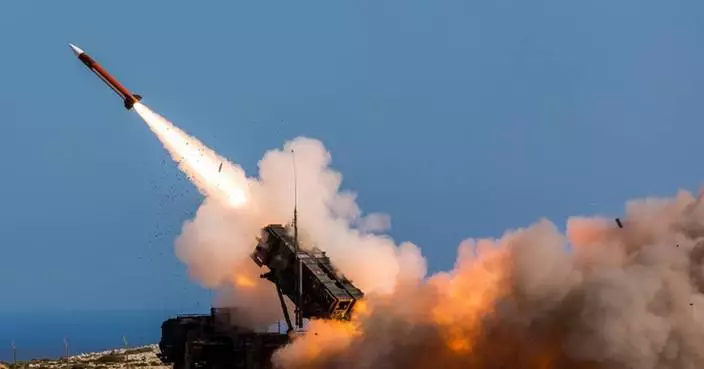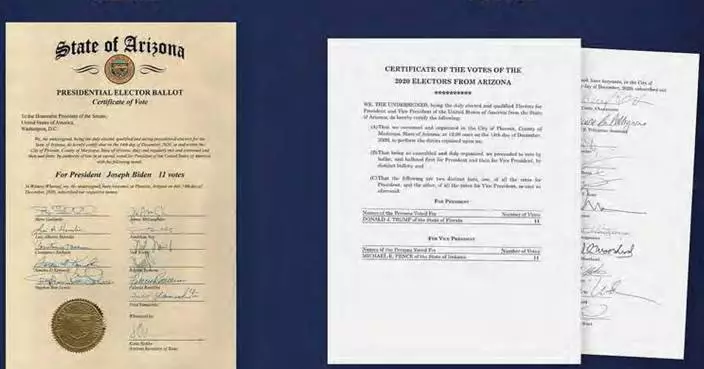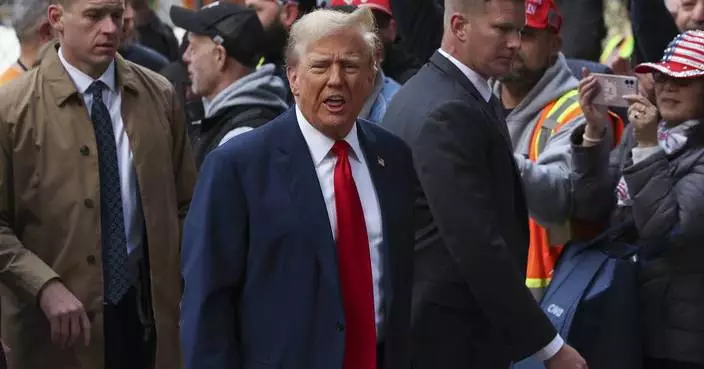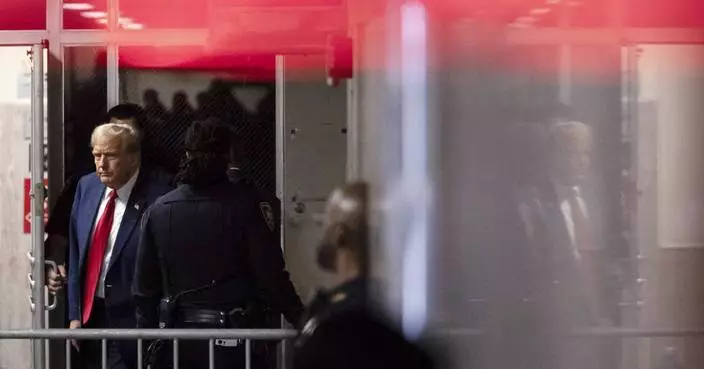President Donald Trump brought the world's two biggest economies to the brink of a trade war Friday by announcing a 25 percent tariff on up to $50 billion in Chinese imports to take effect July 6.
Beijing quickly responded that it would retaliate with penalties of the same scale on American goods — and it spelled out details to impose tariffs on 545 U.S. exports, including farm products, autos and seafood, according to the Xinhua state news agency.
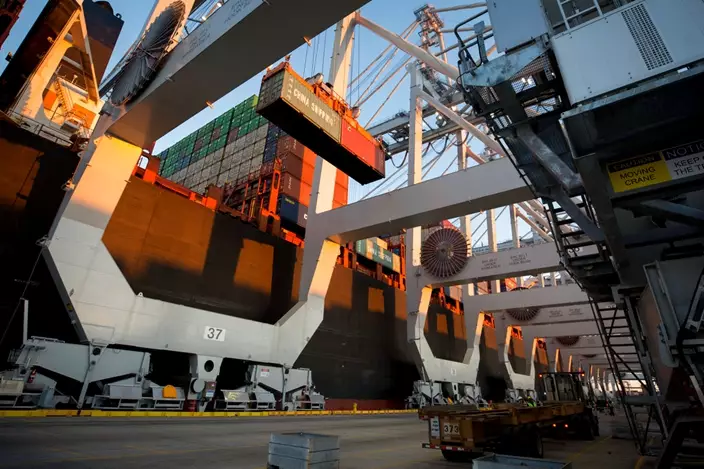
FILE- In this Jan. 30, 2018, file photo, a ship to shore crane loads two shipping containers together onto a vessel at the Georgia Ports Authority's Port of Savannah in Savannah, Ga. China's government renewed its threat Thursday, June 14, to scrap deals with Washington aimed at defusing a sprawling trade dispute as the White House prepared to release a list of Chinese goods targeted for tariff hikes. (AP Photo/Stephen B. Morton, File)
In announcing the U.S. tariffs, Trump said he was fulfilling a campaign pledge to crack down on what he contends are China's unfair trade practices and its efforts to undermine U.S. technology and intellectual property.
"We have the great brain power in Silicon Valley, and China and others steal those secrets," Trump said on "Fox & Friends." ''We're going to protect those secrets. Those are crown jewels for this country."
The prospect of a U.S.-China trade war weighed on financial markets Friday. The Dow Jones industrial average was down more than 220 points in mid-afternoon trading before recovering somewhat to finish down 84 points. Other stock averages also declined.
The U.S. tariffs will cover 1,102 Chinese product lines worth about $50 billion a year. Included are 818 items, worth $34 billion a year, from a list of 1,333 the administration had released in April. After receiving public comment, the U.S. removed 515 product lines from the list, including TVs and some pharmaceuticals, according to a senior administration official who briefed reporters on condition of anonymity.
The administration is targeting an additional 284 Chinese products, which it says benefit from Beijing's strong-armed industrial policies, worth $16 billion a year. But it won't impose those tariffs until it gathers public comments. U.S. companies that rely on the targeted imports — and can't find substitutes — can apply for exemptions from the tariffs.
The Trump administration has sought to protect consumers from a direct impact from the tariffs, which amount to a tax on imports. The tariffs target mainly Chinese industrial machinery, aerospace parts and communications technology, while sparing such consumer goods as smartphones, TVs, toys and clothes that Americans purchase by the truckload from China.
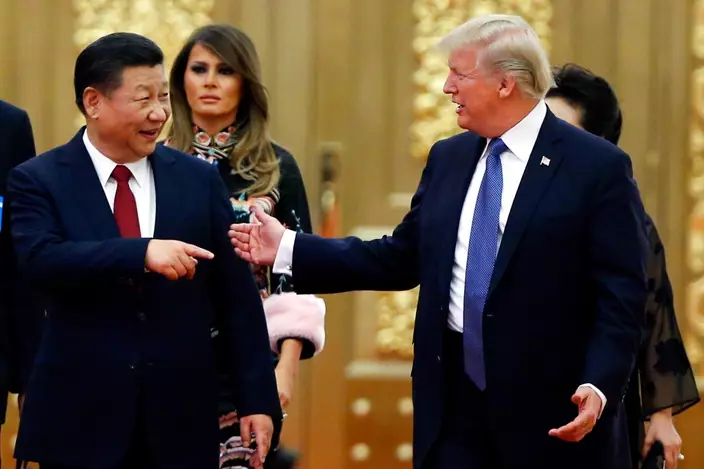
FILE - In this Nov. 9, 2017, file photo, U.S. President Donald Trump China's President Xi Jinping arrive for the state dinner with the first ladies at the Great Hall of the People in Beijing, China. Trump is closing in on a decision to impose punishing tariffs on tens of billions of dollars of Chinese goods as early as June 15, a move that could put his trade policies on a collision course with his push to rid the Korean Peninsula of nuclear weapons. Trump has long vowed to fulfill his campaign pledge to clamp down on what he considers unfair Chinese trading practices. But his calls for about $50 billion in tariffs could complicate his efforts to maintain China's support in his negotiations with North Korea. (Thomas Peter/Pool Photo via AP, File)
These tariffs will impose higher costs on U.S. companies that use the equipment. And over time, those costs could be passed on to consumers. But the impact won't be as visible as it would be if consumer products were taxed directly.
By contrast, the Trump administration earlier this year imposed steep tariffs on imported washing machines. By May, the cost of laundry equipment had jumped 17 percent from two months earlier, according to government data.
The administration characterized the tariffs it announced Friday as entirely proper.
"It's thorough, it's moderate, it's appropriate," U.S. Trade Rep. Robert Lighthizer said on Fox Business Network's "Mornings With Maria."
Lighthizer added, "Our hope is that it doesn't lead to a rash reaction from China."
But Beijing's Commerce Ministry retorted: "The Chinese side doesn't want to fight a trade war, but facing the shortsightedness of the U.S. side, China has to fight back strongly. We will immediately introduce the same scale and equal taxation measures, and all economic and trade achievements reached by the two sides will be invalidated."
A ministry statement gave no details of what U.S. goods would be hit by Beijing's retaliatory tariffs. But China in April had announced possible targets, including light aircraft, orange juice, whiskey, beef and soybeans — an economically and politically important export from America's heartland.
"The farmer can maybe look to their soybean associations for help to find other markets, but that doesn't happen immediately," said Dan Basse of AgResource, an agricultural research and advisory firm. "There's not much the farmer can do right now."
The longer-term concern, Basse said, is that China will increasingly look to Argentina and Brazil and that the United States will lose market share.
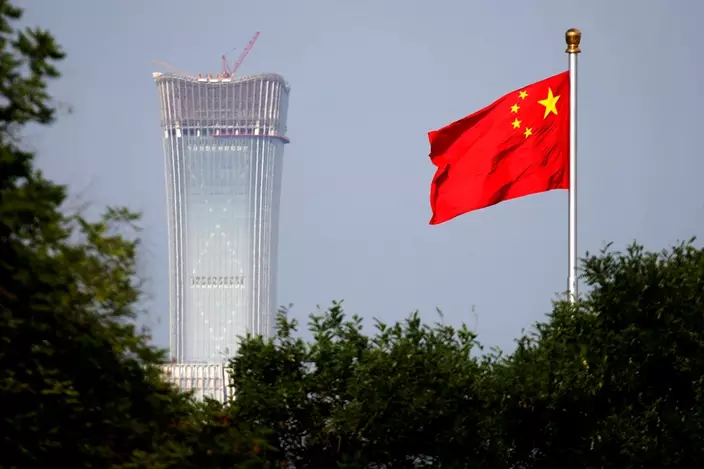
A Chinese national flag at Tiananmen Square flutters against the capital city tallest skyscraper China Zun Tower under construction at the Central Business District in Beijing Thursday, June 14, 2018. U.S. President Donald Trump approved a plan to impose punishing tariffs on tens of billions of dollars of Chinese goods as early as Friday, a move that could put his trade policies on a collision course with his push to rid the Korean Peninsula of nuclear weapons. (AP Photo/Andy Wong)
Trump has already imposed tariffs on steel and aluminum imports from Canada, Mexico and European allies, sparking anger and retaliatory threats from some of America's closest longtime allies. But his proposed tariffs against China risk igniting a damaging trade war involving the world's two biggest economies.
Trump's decision follows his summit with North Korean leader Kim Jong Un. The president has coordinated closely with China on efforts to pressure Pyongyang to eliminate its nuclear arsenal. But he signaled that whatever the implications for that or other issues, "I have to do what I have to do" to address China's trade policies.
By June 30, the administration is expected to finish writing rules to restrict China's ability to invest in U.S. technology.
Most of all, the U.S. tariffs are a response to China's attempts to supplant U.S. technological dominance, including outright theft of trade secrets and its requirement that U.S. companies share technology in exchange for access to the Chinese market.
The Trump administration has also argued that Beijing subsidies favored industries, encouraging them overinvest and overproduce. The result: China has flooded world markets in steel, aluminum, solar panels and products, thereby undercutting prices and putting foreign rivals out of business.
Wall Street has viewed the trade tensions with concern, fearful that they could strangle economic growth and undermine the benefits of the tax cuts Trump signed into law last year.
"Imposing tariffs places the cost of China's unfair trade practices squarely on the shoulders of American consumers, manufacturers, farmers, and ranchers," said Thomas Donohue, president of the U.S. Chamber of Commerce.
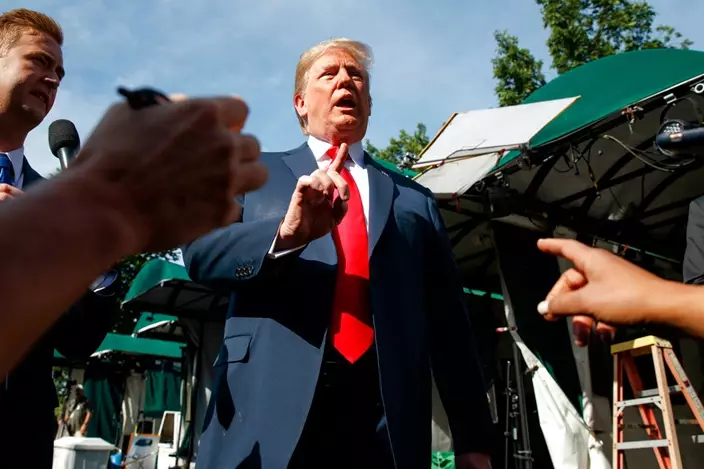
President Donald Trump speaks to reporters on the North Lawn of the White House, Friday, June 15, 2018, in Washington. (AP Photo/Evan Vucci)
Political reactions to Friday's announced tariffs cut across party lines. Senate Minority Leader Chuck Schumer, D-N.Y., said Trump was "right on target."
"China is our real trade enemy, and their theft of intellectual property and their refusal to let our companies compete fairly threatens millions of future American jobs," Schumer added.
But Rep. Dave Reichert, R-Wash., said he disagreed with the action because "Americans will bear the brunt instead of China."
ATLANTA (AP) — As Donald Trump seeks a return to the White House, criminal charges are piling up for the people who tried to help him stay there in 2020 by promoting false theories of voter fraud.
At least five states that were won in 2020 by President Joe Biden have investigated efforts to install slates of electors who would cast Electoral College votes for Trump despite his loss. Those slates were to be used by Trump allies in the House and Senate to justify delaying or blocking the certification of the election during the joint session of Congress on Jan. 6, 2021, which was disrupted by pro-Trump rioters storming the Capitol.
Several of those charged or accused of involvement in election interference across the states are still involved in Republican politics today — including the lawyer overseeing “election integrity” for the Republican National Committee. And Trump, who faces federal charges in Washington and state charges in Georgia for his efforts to overturn Biden's win, frequently still claims the 2020 election was stolen, a falsehood echoed by many of his supporters.
Here's a look at the sprawling web of allegations, criminal charges and references to people in Trump’s orbit as unindicted co-conspirators.
The former president faces state charges in Georgia and federal charges in Washington over efforts to overturn his 2020 election loss and has been identified as an unindicted co-conspirator by investigators in Arizona and Michigan.
The Georgia charges came in a r acketeering indictment in Fulton County in August that accused Trump and 18 others of participating in a wide-ranging scheme — that included the Republican elector effort — to illegally try to overturn his narrow loss in the state.
Trump is the only one charged in the federal indictment in Washington, but several close associates are recognizable as unindicted co-conspirators.
Trump has denied wrongdoing and the U.S. Supreme Court is weighing his arguments that he should be immune from prosecution. He has clinched his third straight Republican nomination for president.
Racketeering and conspiracy are among the charges the former New York mayor and Trump-aligned attorney faces in Georgia. In Arizona, the charges against him have not yet been made public.
In Michigan, a state investigator has testified that Giuliani is among several high-profile unindicted co-conspirators in a case against Republicans who signed elector certificates falsely saying Trump had won the state.
He's also an unindicted co-conspirator in the federal indictment in Washington, which cites comments he made at the “Stop the Steal” rally prior to the Capitol riot.
His spokesman, Ted Goodman, said in a statement Thursday that the “continued weaponization of our justice system should concern every American as it does permanent, irrevocable harm to the country.”
Bobb is a lawyer and conservative media personality charged in Arizona. She worked closely with Giuliani as he tried to persuade Arizona lawmakers to block the certification of the election results. She later raised money for a discredited audit of the election results in Maricopa County and covered the spectacle for One America News Network.
As lawyer for Trump, Bobb signed a letter stating that a “diligent search” for classified records had been conducted and that all such documents had been given back to the government before an FBI search revealed dozens of protected documents at his Mar-a-Lago residence.
She was recently tapped to oversee “election integrity” efforts at the Republican National Committee.
Asked about Bobb's role with the RNC, Trump campaign spokesman Steven Cheung accused Democrats of “weaponization of the legal system.”
A longtime Trump aide, Epshteyn was charged in Arizona, where a grand jury accused him of assisting with the fake electors plan.
He's a lawyer who has been by Trump's side for some of the former president's own court appearances, including Thursday and Friday in New York.
Epshteyn was a principal surrogate in the 2016 presidential campaign, making frequent television appearances. He briefly served as a senior White House adviser before becoming an analyst for Sinclair Broadcast Group.
Trump's White House chief is charged in the sweeping Georgia racketeering indictment, but not in connection with the Republican elector meeting. Among other things, he participated in a January 2021 phone call between Trump and Georgia Secretary of State Brad Raffensperger during which the then-president urged the elections official to help “find” the votes needed to overturn his narrow loss in the state.
Meadows' charges in Arizona are not publicly known. He was also identified by the Michigan state investigator as an unindicted co-conspirator.
His attorney, George Terwilliger, referred to Wednesday's indictment in Arizona as a “blatantly political and politicized accusation and will be contested and defeated.”
Meadows now works for the Conservative Policy Institute, a Washington think tank that describes his role as leading “strategic initiatives on Capitol Hill, with other partner organizations, and with grassroots activists across the country.”
A former dean of Chapman University’s law school in Southern California, Eastman wrote a memo arguing that Trump could remain in power if then-Vice President Mike Pence overturned the results of the electoral certification during a joint session of Congress using the slates of Republican electors from the battleground states.
The charges against him in Georgia include racketeering and conspiracy, while the Arizona charges have not been made public. He's also named as an unindicted co-conspirator in the federal indictment, which quotes his remarks at the Jan. 6, 2021, “Stop the Steal” rally in Washington.
He has pleaded not guilty to the charges in Georgia and his lawyer Charles Burnham said he's innocent of the charges in Arizona.
Ellis was charged in the Georgia indictment after she appeared with Giuliani at a December 2020 hearing hosted by state Republican lawmakers at the Georgia Capitol during which false allegations of election fraud were made. She pleaded guilty in October to one felony count of aiding and abetting false statements and writings after reaching a deal with prosecutors. She wasn't charged in connection with the Republican electors efforts in Georgia.
It wasn't immediately clear whether she had a lawyer in Arizona who could comment on charges she faces there, which have not yet been made public.
A Trump campaign staffer and onetime White House aide, Roman was charged with several conspiracy counts related to the Republican elector meeting and the filing of the elector certificate in Georgia. He was also charged in Arizona.
Roman has pleaded not guilty to the charges in Georgia. It wasn't immediately clear whether he had a lawyer in Arizona yet.
Chesebro, a lawyer, worked with Republicans in multiple swing states to coordinate and execute the Trump elector plan. He was charged with racketeering and several conspiracy counts in relation to that work in Georgia and in October reached a deal with prosecutors to plead guilty to one felony charge of conspiracy to commit filing false documents.
Chesebro is an unindicted co-conspirator in Trump's federal election indictment, which says he "assisted in devising and attempting to implement a plan to submit fraudulent slates of presidential electors to obstruct the certification proceeding.”
He was also named in the Wisconsin civil lawsuit, and when he turned over documents to settle that suit he didn't admit liability but promised never to participate in similar efforts.
A lawyer and unflinching Trump ally, Powell was charged with racketeering and conspiracy charges in Georgia but was not implicated in the elector scheme. The Fulton County indictment accused her of participating in an unauthorized breach of elections equipment in a rural Georgia county elections office. She pleaded guilty in October to six misdemeanors accusing her of conspiring to intentionally interfere with the performance of election duties after reaching a deal with prosecutors.
She's an unindicted co-conspirator in the federal election interference case, where prosecutors say she filed a lawsuit in Georgia that amplified false or unsupported claims of election fraud.
Clark was a U.S. Justice Department official who championed Trump’s false claims of election fraud. He was charged in Georgia with racketeering and criminal attempt to commit false statements and writings after he presented colleagues with a draft letter pushing Georgia officials to convene a special legislative session on the election results.
He has pleaded not guilty to the charges in Georgia.
He was also one of the unindicted co-conspirators in the federal election indictment against Trump.
In addition to Arizona, criminal charges have been filed against Republicans who presented themselves as electors in Michigan, Georgia and Nevada. Wisconsin Republicans who signed elector certificates reached a settlement in a civil lawsuit, admitting their actions were part of an effort to overturn Biden’s victory. No charges have been filed in Pennsylvania or New Mexico, with the attorney general in the latter saying there’s no avenue for prosecution under state law.
Associated Press writer Jonathan J. Cooper in Phoenix contributed to this report.
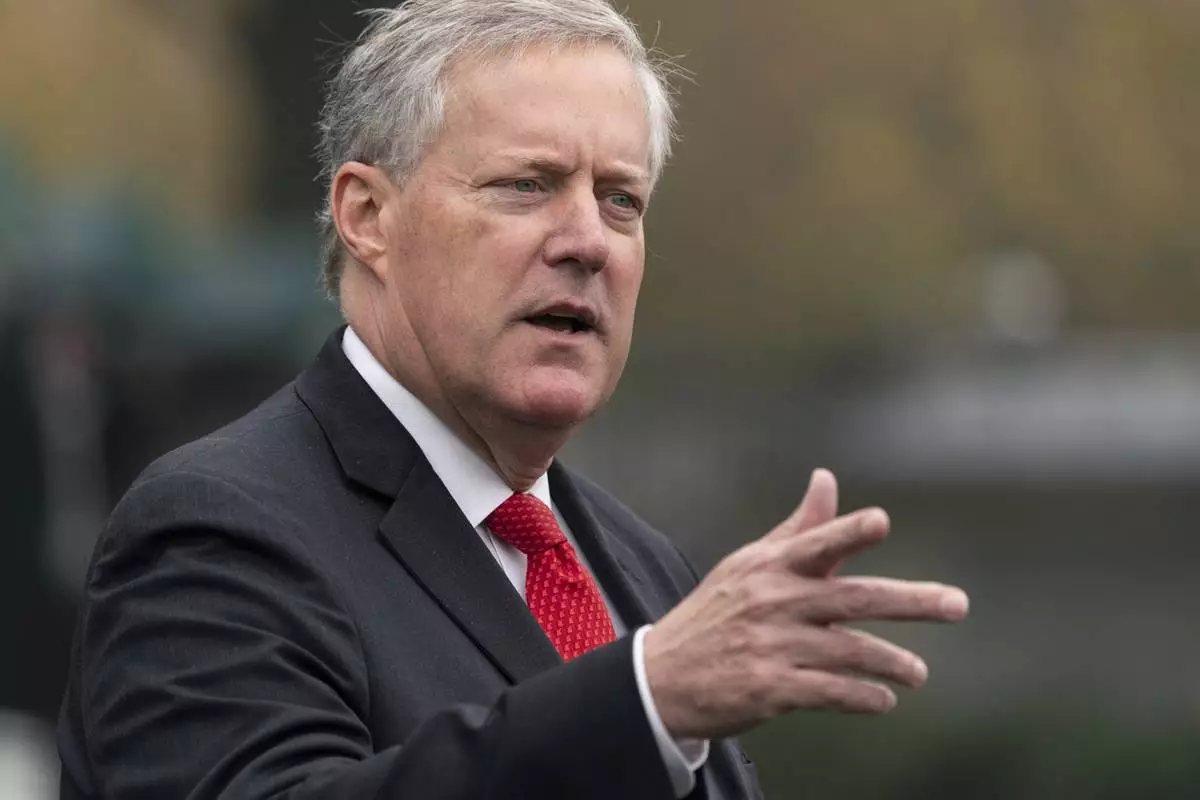
FILE - Mark Meadows speaks with reporters at the White House, Oct. 21, 2020, in Washington. Meadows, chief of staff for former President Donald Trump, was among those indicted Wednesday, April 24, 2024, in an Arizona election interference case. (AP Photo/Alex Brandon, File)
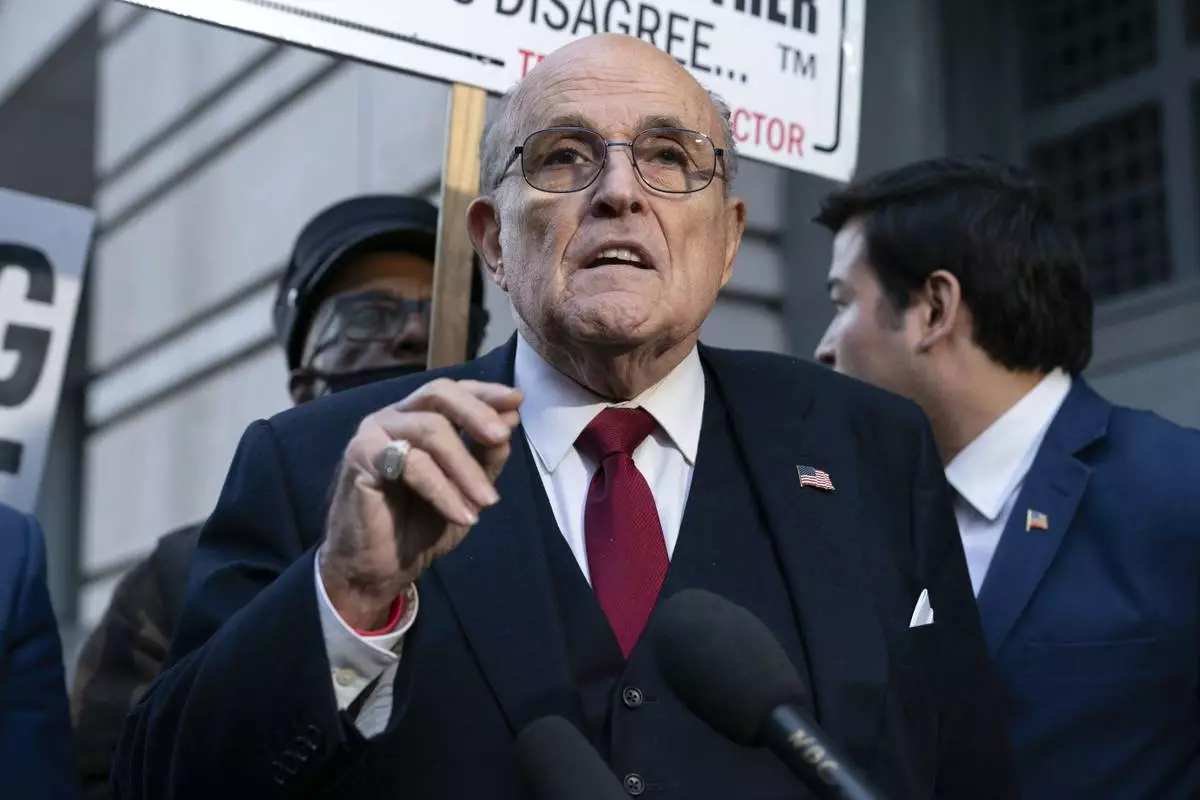
FILE - Former Mayor of New York Rudy Giuliani speaks during a news conference outside the federal courthouse in Washington, Dec. 15, 2023. Guiliani, a lawyer for former President Donald Trump, was among those indicted Wednesday, April 24, 2024, in an Arizona election interference case.(AP Photo/Jose Luis Magana, File)
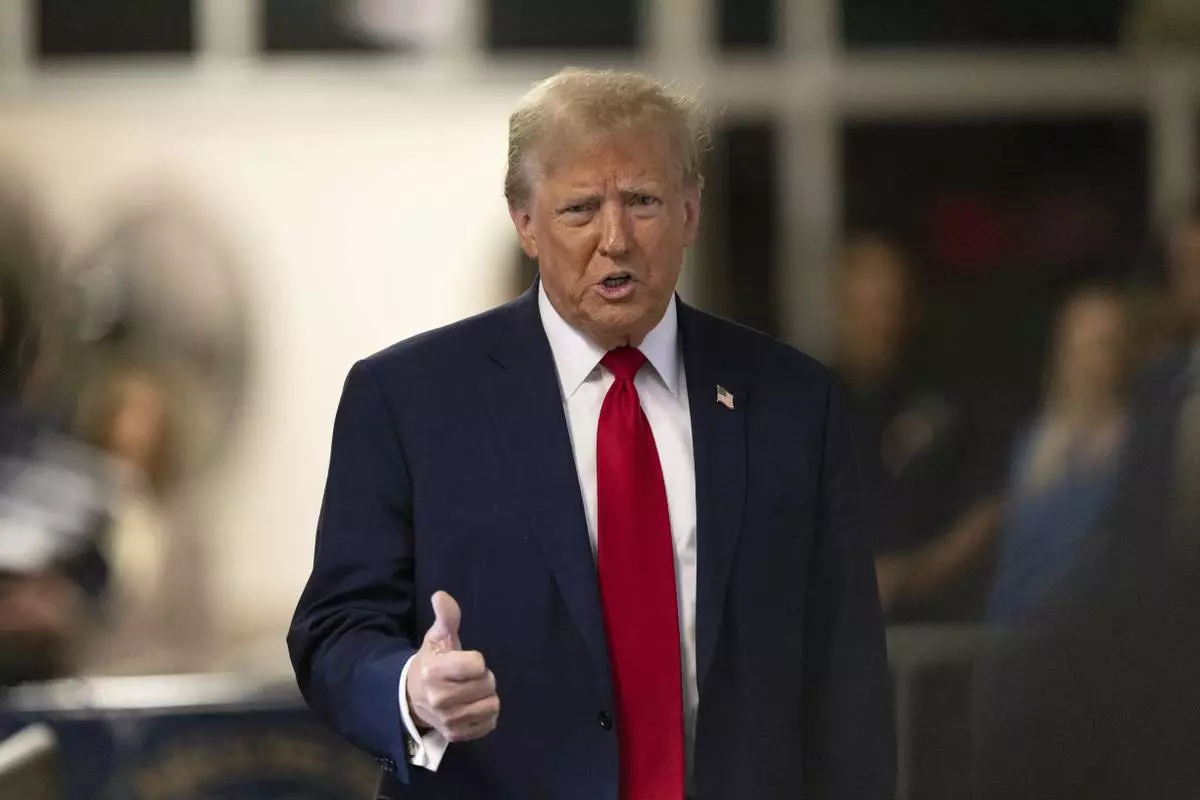
Former President Donald Trump speaks to members of the media at Manhattan criminal court in New York, Thursday, April 25, 2024. (Jeenah Moon/Pool Photo via AP)










